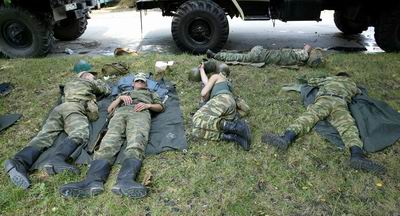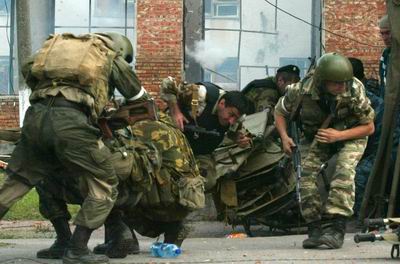
Russian Soldiers took a break after the hostage crisis
ended on August 4.--Xinhua

Russian special forces troops run for cover while soldiers stormed
a building seized by heavily armed masked men and women in the town of Beslan in
the province of North Ossetia near Chechnya , September 3, 2004. Russian
soldiers battled Chechen separatists on Friday to end a two-day-old school siege
as naked children ran out screaming amid explosions and machinegun
fire.--Xinhua/REUTERS
Russian special forces put an end Friday evening to a three-day
hostage-taking crisis that has claimed lives of at least 200 children and
innocent adults in a southern Russian school.
More than 400 hostages, held by armed militants for over 50 hours
since Wednesday in a secondary school in the town of Beslan in North Ossetia, a
republic bordering Chechnya in southern Russia, managed to escape with the help
of the special forces.
The Itar-Tass news agency reported earlier that 704 people were
injured during the standoff between hostage-takers and Russian security forces,
while Interfax said 531 remained in hospital by early Saturday morning.
The republic's Deputy Health Minister Taimuraz Revazov confirmed that
283 children are still in hospital and 92 of them in critical condition.
Intensive exchanges of gunfire lasted for some 10 hours Friday between
Russian troops and the gunmen, killing 27 militants but leaving four others at
large, who are being pursued by law enforcement agencies.
Aslanbek Aslakhanov, an advisor to Russian President Vladimir Putin,
said militants claimed that they had initially seized 1,200 people and 70
percent of them were children.
AUTHORITIES SAY NO USE OF FORCE PLANNED FOR FREEING HOSTAGES
Authorities confirmed that the special operation launched by Russian
troops to save the hostages had not been planned in advance but was an immediate
reaction to the gunmen's killing of hostages instead.
"No military action had been planned. We were ready for holdingfurther
talks," Valery Andreyev, regional chief of the Federal Security Service (FSB),
said Friday in TV broadcast.
He added that authorities had reached an agreement with the
hostage-takers to let Russian Emergency Situations Ministry staff fetch the
bodies of those killed in the school area.
North Ossetian President Alexander Dzasokhov also said there had been
no plan to end the school siege by force.
Two successive powerful explosions went off about 1:15 p.m. Moscow
time (0915 GMT) Friday when workers were trying to collect the corpses and
hostages then started to run out of the school building.
The gunmen opened intense fire at the running adults and children,
forcing Russian troops to fire back upon the hostage-takers.
Russian forces began to storm the school after some 30 childrenand
women broke out of the building. Some women fainted and otherswere carried away
on stretchers. Many children, only in their underwear, ran out screaming and
begged for water.
Earlier reports said more than 100 bodies had been discovered inside
the school's gymnasium where most of the hostages had been held without water
and food.
Interfax said the explosions were set off by the militants inside the
building and caused partial collapse of the school's roof.
CHECHEN REBELS, INTERNATIONAL TERRORISM SAID TO BE BEHIND
CRISIS
The heavily armed militants seized the school Wednesday morning,when
children along with their parents and teachers attended a ceremony celebrating
the first day of Russia's new school year.
Dzasokhov said the attackers had demanded that Russian troops withdraw
from Chechnya -- the first clear indication of a direct link between the siege
of the school and the restive situation in the neighboring Chechnya.
FSB said Chechnya's notorious warlord Shamil Basayev masterminded the
hostage-taking, which was carried out by field commander Magomet Yevloyev.
Yevloyev is a subordinate of Basayev and in the clan of Zelimkhan
Yandarbiyev, who served as acting president of the rebellious Chechen government
from 1996 to 1997, according to Andreyev.
Information also indicated that one of the Wahhabism ideologists, Abu
Omar al-Seif, al-Qaeda's liaison in Chechnya, funded the hostage-taking.
In addition, among the 27 militants killed in the special operation on
Friday, 10 are from Arab countries, the Interfax newsagency reported.
The hostage-taking tragedy, the latest in a wave of violent attacks
over the past 11 days blamed on Chechen rebels, dealt a serious blow to the
Kremlin's decade-long effort of bringing breakaway Chechnya back under rein.
An explosion, triggered by a female suicide bomber near a metrostation
Tuesday in northeast Moscow, killed 10 people and injured 37 others.
The explosion came after Sunday's presidential election in Chechnya,
in which the Kremlin-backed Alu Alkhanov won a landslidevictory to replace
pro-Moscow Akhmad Kadyrov, who was killed in a terrorist bomb blast on May 9.
Just five days before the election, two Russian passenger planes
crashed almost simultaneously, killing all the 90 people aboard. The crashes
aroused fears that terrorist attacks were behind the tragedies.
Russia has suffered a number of serious terrorist attacks over the
past years.
The hostage-taking raid brought back nightmarish memories of a similar
incident at a Moscow theater in 2002, in which 130 spectators died when police
stormed the building.
In 1995, in the midst of the first Russian-Chechen war, some 200
Chechen rebels stormed a hospital in the Stavropolsky region and seized up to
1,000 people hostage. The standoff lasted for several days and ended with
Russian forces storming the hospital, leaving more than 100 people dead on all
sides.
Chechnya, a war-torn republic in Russia's Northern Caucasus, won de
facto independence in 1996 after the pullout of Russian troops. Federal soldiers
returned to the lawless republic in September 1999. Since then, a guerrilla war
between Chechen rebelsand federal troops has persisted, occasionally spilling
into neighboring regions.
Putin pledged Wednesday that the government is prepared to holdtalks
with all forces in Chechnya, except terrorists and separatists.



